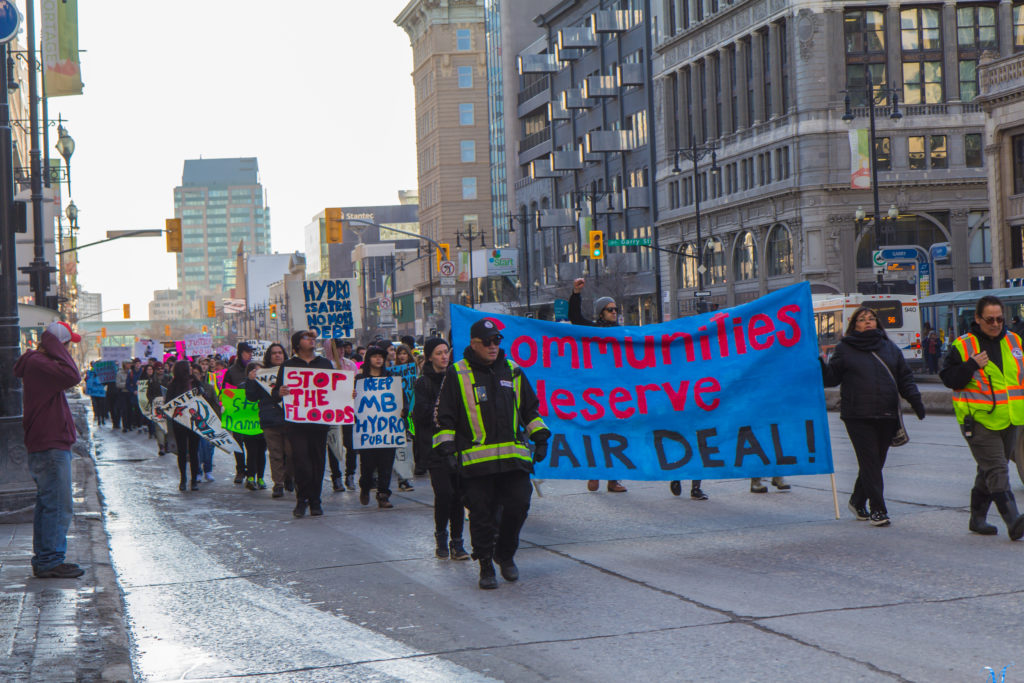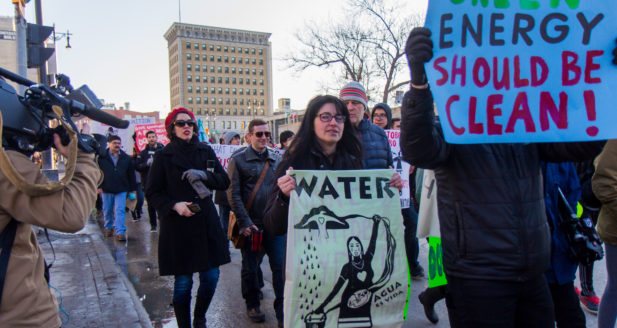
Recap of Event – Dispelling the Myths!
Dispelling the Myths of Hydro in Manitoba
On World Water Day, March 22nd, we wanted to challenge the notion that hydropower is clean and green. It was a chance to walk in solidarity with and support of hydro-impacted communities across Manitoba. It was also an opportunity for Winnipeggers to hear directly from Indigenous people living in these impacted communities and learn.
The event began at the Manitoba Hydro Building in Downtown Winnipeg, where over 150 people gathered. Sadie Phoenix Lavoie, Community Coordinator of Wa Ni Ska Tan, and Laura Tyler, Manitoba Energy Justice Coalition, provided reminders as to why we were gathered and got us pumped up for the march. A few people from the crowd also shared stories as we waited for Bear Clan Patrol to escort us to the Circle of Life Thunderbird House. We left the Hydro building with posters in our hands, and excitement boiling over as we chanted our way towards the Thunderbird House.
Upon arrival, the room quickly filled up with people of all ages. They grabbed stew and bannock, getting ready for the speaker portion of the evening. Five amazing Indigenous voices shared stories about their experiences. Carol Kobliski from Nelson House talked about the social impacts caused by Hydro in her community, having lived there her whole life, and how she and her family were uprooted due to flooding. Leslie Dysart from South Indian Lake spoke about the demise of North America’s second largest fishery, licensing and the Augmented Flow Program, and how his family’s lives have been forever impacted. Elder Elmer Courchene spoke about the importance of educating and involving youth in learning about their history.
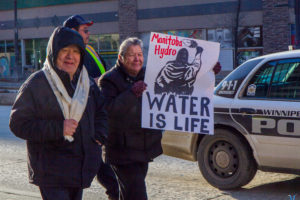
Gerald McKay from Grand Rapids spoke of his experience as a fisherman, and how his childhood was turned upside down due to the construction of the dam. Lastly, Elder Rita Monias shared her experiences as an activist, and also as someone who remembers life before hydropower development in Cross Lake. She spoke to how the Churchill River Diversion affected her land and her people, explaining what roles she has played to help her community and fight for justice. What the speakers all said was that although their stories were different, they were also the same. Flooding, loss of livelihoods, grief, social discord, and displacement due to hydropower and dams. It was a somber reminder but also a call to action. It is still possible to right some of these wrongs. The event was a reminder that together we are strong and hydro-impacted communities are not alone. For media coverage of the event and ways to take action, see below.
A Brief History of Hydropower in Manitoba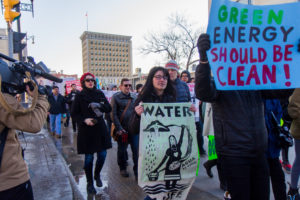
Manitoba Hydro provides renewable energy to Manitobans through dams, promoting themselves as a environmentally conscious and responsibly practicing corporation. The façade they create is far from reality though, and it can be a challenge to understand for those living in southern Manitoba, since most of us have not experienced the impacts caused by development.
The corporation has caused unimaginable destruction to the people of northern Manitoba. Deals like the Northern Flood Agreement (NFA) were signed to limit the implications of flooding, and provide a system of regulation for Hydro to operate its dams in First Nations’ territories. Following the NFA were implementation agreements, which were signed by four communities, with Cross Lake being the only community affected by the Churchill River Diversion to not sign this modern treaty. It is important to remember that hydro also effects southern Indigenous communities too, like Sagkeeng First Nation. Regulations surrounding Lake Winnipeg and water levels, as well as transmission lines which run right-through their traditional territory are two of the major concerns for Sagkeeng.
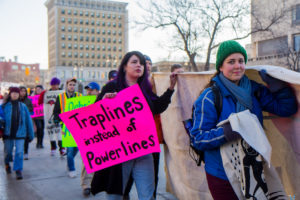
Hydro has and continues to deviate from its original licenses, which has environmental consequences including the disappearance of rivers, the releasing of mercury into the environment, mass erosion, and destruction of both aquatic and non-aquatic wildlife habitats. Social impacts include a greater dependency on social services like welfare into communities because traditional livelihoods have been lost to development. In some cases entire communities have been relocated and ancestral lands and burial sites have been flooded.
How we define clean and green energy is debatable. There is no no strict set of standards to define these terms. Questioning our energy sources is important as we continue to move towards mitigating climate change, and hydropower should be no exception to this conversation on how we define clean, green, and renewable energy. Learn more by checking out our Resources.
City News Video with interviews from the rally and march
Join the Letter Writing Campaign to Support Communities Impacted by the Augmented Flow Program


